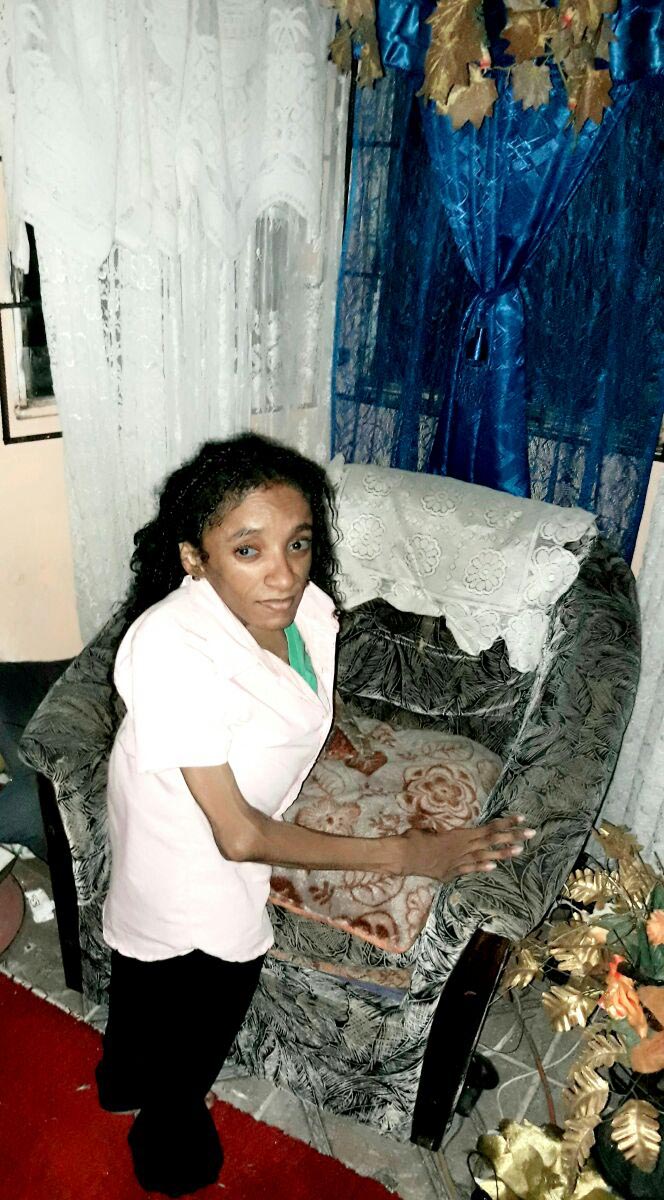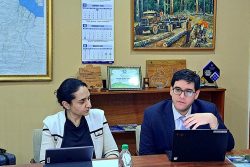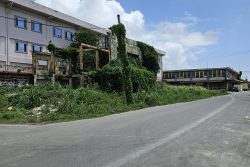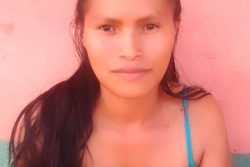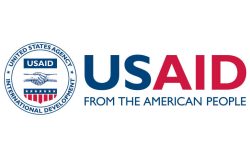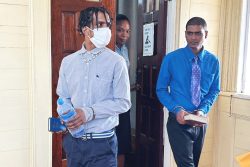Stacy Johnson is not one to accept the statistics of life. According to PAHO/WHO, only 25% of children with disabilities have access to education, and only 5% finish primary school. Stacy not only finished primary school but completed high school. And if she has her way, she is not done yet.
Born with a disability called Osteogenesis Imperfecta (OS) Type III, a rare genetic disorder characterized by increased bone fragility, low bone mass and susceptibility to bone fractures, the Tucville Terrace, Georgetown resident believes that disability is not a sickness, but instead it teaches one to adapt in order to keep moving forward.
Despite failed attempts to further her studies following high school, due to the lack of accessibility, 30-year-old differently abled Stacy Johnson keeps beating the odds and has even considered pursuing writing as a career.
“Living with a disability teaches you to adapt and change in order to keep up. It’s not easy because you still have the typical responsibilities and problems of the average person, along with a very specific set of problems related to your disability. It can be incredibly frustrating at times. But it also teaches you things like resourcefulness, discipline, creativity, humility, patience, graciousness and respect,” Stacy told Stabroek News.
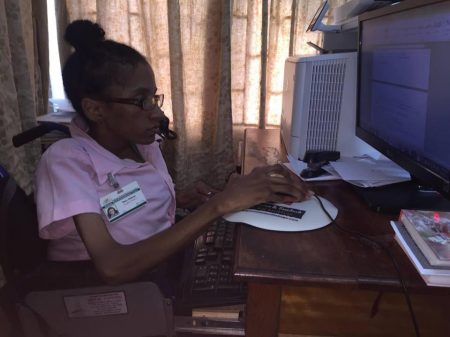
Fully aware that there is no cure for her genetic disorder and having undergone the physiotherapy programme that may help some patients with the disability to strengthen their muscles, she has refused to settle on the wheelchair as her only means of moving around. Stacy walks around the house on her knees with the support of the furniture and has even learnt to get up and down the stairs on her own.
Johnson explained that with OS, one’s bones are prone to breaking from the slightest trauma. “Things like rolling, sneezing, coughing and even putting on your clothes can cause you to fracture your bones,” she said, while noting that she has had between 70 and 100 fractures since birth. However, the fractures tend to decrease after puberty.
At the age of eight, Johnson underwent surgery to straighten her leg. The surgery was successful as the doctors tried to see if she could have walked with the aid of braces and crutches, but she began to suffer fractures in another part of her leg. “The part of my leg that I am most prone to getting fractures in were my femurs, so once they were corrected with these rods, I began to have fractures in my lower legs,” she explained.
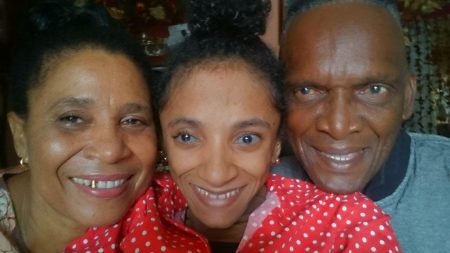
She noted that the teams of doctors who had operated on her upper legs to correct them were from North Ameri-ca and were available here regularly. “Eventually I had enough fractures so it affected by right leg, until it was so severely affected that I couldn’t use the braces anymore and settled on the wheel chair full time,” she recalled.
“I think at that time the most that could have been done for me, in terms of rehabilitation-wise, had been done and it wasn’t a case if I had continued therapy I would be able to walk or run or anything,” she said, while noting that it has already been established that she would not be able to walk.
Despite having missed half of primary school, Johnson attended the North Georgetown Secondary School, where she sat eight subjects at the CSEC level, attaining four Grade ones, three Grade twos and one Grade four.
“I was able to attend Tucville Primary School, by my family coming up with kinda their own ways to comprise”, Johnson said. According to her, secondary school was much easier since the school was a flat structure and she was able to move around easily. “I only had issues doing the Agriculture Science and Home Economics”, she said noting that sometimes, she was given alternative projects instead of the practical ones since she was unable to go into the fields and to the labs.
After high school, Johnson was eager to further her studies but couldn’t due to the lack of accessibility.
The biggest challenge
For Johnson, the lack of accessibility for persons living with disabilities in Guyana has denied her a lot of her goals. “I would love to be settled in a profession and able to support myself financially, but the hard part is the steps to take to get there”, she observed while adding that “furthering my tertiary education is a key step, but I’d like to be able to do this without utilizing anyone else’s time and resources, but my own, and that’s another issue. It’s something I’m still figuring out.”
Johnson attempted to attend the University of Guyana (UG) to pursue her studies in either the fields of Communications or Management, but despite being qualified to enter the tertiary institution, she ultimately withdrew her application when she realized it would be difficult for her to move around campus, and transportation would have become an issue.
“It was a combination of lack of accessibility and transportation and my own personal and home factors,” Johnson explained, while adding that it would have necessitated having someone around to assist her all the time. “For me, this is a challenge right now because I don’t know how I will be able to attend university if I had to just stop working and do things like finding transportation and have somebody be around me and so,” she said.
After encountering this stumbling block, Johnson tried enrolling in sixth form but again the school wasn’t accessible. She also signed up for a course but was unable to continue. “I was in an environment where it wasn’t accessible; I had to be taken upstairs and carried downstairs and there was this one time when I was in the class room and there was this teacher that had to move me and that was like really awkward,” she lamented.
She applied for several jobs but emphasized that most buildings here are not disability-friendly and persons don’t really have the most confident of attitudes when it comes to employing persons with disabilities. “Opportunities here for persons with disability in Guyana are not many. For instance, schools and jobs,” she said, whilst relating that there are several persons with disabilities that have managed to attend school and worked hard academically, but are unable to find a job because they are not many to accommodate them.
For the past twelve years, she has been employed at the Ptolemy Reid Rehabilitation Centre (PRRC) as a typist/clerk. She is tasked with preparing reports and responding to emails. She also assists with managing the centre’s website and Facebook page.
Ever since birth, Johnson said, she was an out-patient of the centre. From the age of two-weeks-old up until she was a 13-year-old, she attended the PRRC twice a week for therapy.
Still, Johnson has not settled. She is now having difficulty deciding the exact route as to how she can improve herself through her studies and to move on to a career path that can make her more independent. “Because I have been out of school for quite a while honestly I feel like I have lost my confidence in furthering my studies,” she noted. “I mean it is something that I do want to do but I don’t feel as capable as I did years ago when I was younger,” she added.
One avenue she has been exploring, following the advice of her family, is writing. “I wrote a book sharing my experience about of living with OS in Guyana,” she said. However, it has to be edited and published.
Daily encounters
Despite being subjected on a daily basis to a lot of attention due to her appearance, Johnson said she hasn’t really encountered many hostile reactions. What she encounters most is curiosity.
There have even been instances where persons think that she is unable to speak or understand them, so they will speak to the individual who is closest to her instead of making direct contact. “…Or someone might speak to me in childish manner. In instances like these, I understand that these people are unfamiliar with me and probably persons with disabilities in general, so they don’t know what to expect or how to act. I know it’s not really intentional,” she related. “People would stare… because they don’t usually see people like me, but that I would understand and I don’t have a problem with that,” she added.
Johnson also shared some of the encounters that cheer her up after a “down day.” “One afternoon my Mother and I were waiting for my sister’s lessons to be over and a nice young family walked by us. They had an infant girl and another girl who looked about four and was dressed in a leotard and a pink tutu. The little girl looked at me and said something to her mother. Then the family turned and headed over to us. I had had a really hard day and feeling miserable about my appearance and self in general, so I braced myself expecting the little girl to come over and ask me why I looked the way I did,” Johnson recalled, detailing the encounter.
She added that she tried to appear as friendly as possible as they walked towards her direction. “When they came over though the girl’s mother said her daughter just wanted to know if she could hug me. It was the sweetest thing and cheered me up immensely, and I gave her a hug,” she added.
Like a lot of people, Johnson likes adventures and enjoys going out with her family and friends. “I like to go out, but accessibility is always a huge issue here, so I don’t go out that much. And then it’s mostly to restaurants or cafes. Even rarer are the establishments with washroom facilities that I can get into. I’ve visited clubs a few times with my best friend, it’s only like ten times over the course of five years, to be precise. But in a way that’s kind of much considering people don’t expect you to go out at all when you have a disability. Activities and places that are outdoors are very hard to manage, especially washroom wise, so they really aren’t an option,” she explained.
The young woman, who likes to keep herself active, wishes for Guyana to one day have an assisted-living facility, where persons with disabilities could live independently with minimal support. “I would like to see myself living in one of those assisted living facility where I would be able to live on my own with minimal support, maybe with just someone who comes occasionally to assist with things like housework that I can’t do or maybe if I am fortunate enough to be able to migrate to another country someday it may be easier for me to study then work,” she said. “I am independent as I can be at home but for instance I can’t use my wheelchair at home because there is not much room and then the entrance to get in and out of my house is also difficult…,” she said. She envisions a home that is accessible for her. “One where I wouldn’t have to use stairs and with enough room to use my wheelchair in. With a bathroom and kitchen area that would be easier for me to use. Whilst I can move around my parents’ home, it’s not easy to do so, especially as I am getting older, and I’m unable to use our kitchen to prepare meals for myself,” she added.
